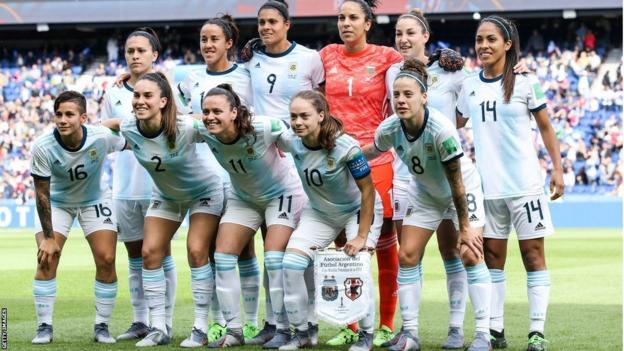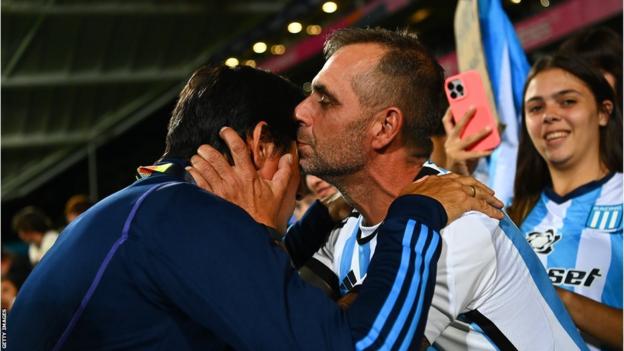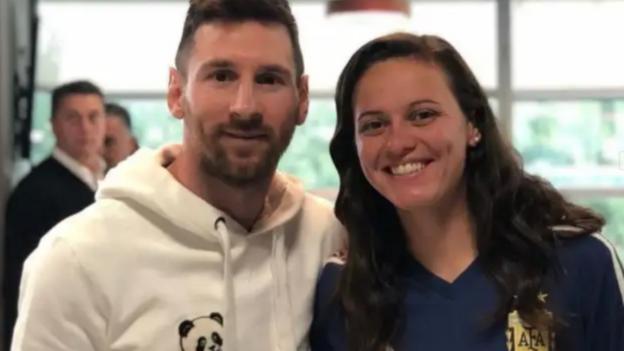
| Dates: 20 July-20 August Co-hosts: Australia and New Zealand Coverage: Watch on BBC television, BBC iPlayer, BBC Sport website & app; listen to commentary on BBC Radio 5 Live; follow live text on the BBC Sport website. Click here for Women’s World Cup TV schedule |
“To be honest, I cried. I cried a lot,” said Vanina Correa, who is about to captain Argentina in New Zealand at the 2023 Fifa Women’s World Cup.
The veteran goalkeeper, who was in the squad for the 2003 edition in the United States, is talking about his emotions when the national men’s team was crowned world champion last December.
An estimated five million people poured on to the streets of Buenos Aires to give Lionel Messi and his team-mates a hero’s welcome home after defeating France on penalties in the final in Qatar.
Seven months on from those incredible scenes in Argentina’s capital, La Albiceleste are preparing for their opening match at the Women’s World Cup against Italy at Eden Park, Auckland, on 24 July (07:00 BST).
No country has managed to hold the World Cup for both the men and women at the same time. That is unlikely to change in the coming weeks.
While Argentina are on top of the world in the men’s game, the women – 28th in Fifa’s rankings – have not won a match at their three previous appearances at the global tournament in 2003, 2007 and 2019.
That perhaps explains why there is little evidence in the football-obsessed country that boss German Portanova and his players are about to take part in the biggest women’s sporting event.
“Most people in Argentina are fans of football – but women’s football, it’s not that popular,” Daniela Lichinizer, a sports reporter for TN Deportivo in Argentina, tells BBC Sport.
“I’m sure most of them don’t know that our national team is playing in a World Cup in a few days’ time. There are no television commercials promoting it right now. It’s a little bit sad.”

6,000 miles and 3am kick-offs
Up to 40,000 Argentinian fans were in Qatar in December but the numbers in New Zealand backing the women for group matches against 2019 quarter-finalists Italy, African champions South Africa and World Cup heavyweights Sweden are likely to be in the hundreds instead of thousands.
Argentina has been facing an endless economic crisis and with soaring inflation, the men’s triumph was a rare chance for a national outpouring of celebration.
The Women’s World Cup, however, is taking place 6,000 miles away and such is the time difference that two of their three group matches – against Italy and Sweden – kick off when it is 3am and 4am respectively in Argentina.
“I guess people are not going to wake up in the middle of the night to watch the matches,” added Lichinizer.
The vast majority of their fanbase for games in Auckland, Dunedin and Hamilton is expected to come from the estimated 2,000 Argentines already living in New Zealand.
“We were in New Zealand in February for three friendly matches,” Stefania Leon, Argentina’s women’s media officer, said.
“There weren’t a lot of Argentina fans but those who attended the games were loud. I know of some crazy fans who are traveling from Argentina to the World Cup, but they are very few. It’s certainly not going to be like Qatar. “

‘I had lunch with Messi’
Argentina’s team will draw inspiration from Messi’s achievements in Qatar as they look to reach the knockout rounds for the first time.
”It is a big inspiration, but the expectations are not the same,” striker Paulina Gramaglia, comparing the objectives of the men’s and women’s teams, says.
“We don’t have the same foundation that they have, we are not seeking to win the trophy. We have our own goals and our own context.”
Four years ago, players got to meet Messi at Argentina’s national training centre, where the men were preparing for the Copa America in Brazil at the same time as the women were getting ready for the World Cup in France.
“I know Leo, we shared a lunch before going to the last World Cup,” midfielder Florencia Bonsegundo says.
“What surprised me most was that he [Messi] was the only player who stayed for photos.”
Lichinizer said it was rare for the men’s and women’s teams to mix.
“When you ask the [women’s] players about that day, they will tell you it was only lunch,” she added. “The men were on one table and the women were on another table.
“I haven’t yet seen a video or a message from the men’s team supporting the women’s team before they go to New Zealand. That may change as we get closer to the World Cup. I hope it does.”

From shoe factory to World Cup
There are no lucrative sponsorship deals for women’s players in Argentina, while forward Estefania Banini – regarded as the Messi of the women’s team – has played much of her club football away in Spain.
The squad assembled by Portanova to get Argentina through the group stage is full of stories.
There is defender Miriam Mayorga, who is nicknamed ‘Doc’ by her team-mates as she is a qualified doctor.
Correa, who is appearing at her fourth World Cup, quits the game in 2012 and gave birth to twins before going from “being retired in every sense of the word” to playing in the 2019 World Cup in France.
With her 40th birthday approaching next month, she is one of the oldest players at this World Cup.
Portanova, a former midfielder, worked at a shoe factory following the end of his playing career before starting as a coach.
“A friend of mine had a factory, customers, the whole lot,” said the Argentine. “It went well, but I wasn’t happy.”
Speaking about his appointment as national women’s team boss in 2021, he said: “I’m quite religious and I think God was preparing me for this moment.”
Argentina is the nation that gave the tango to the world, but will they be dancing on the streets of Buenos Aires if they win a first match at the Women’s World Cup?
“I don’t think the men’s success at the World Cup has put pressure on the women because they know that they have never won a match at this tournament,” says Lichinizer.
“To win a first Women’s World Cup match, that would be the best.
“That would make the fans excited about the tournament and would tell them the women’s team is also our national team and they represent us the same as the men do.”
